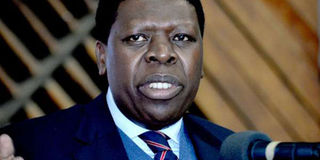Turf wars linked to control of billions at irrigation board

Water and Irrigation Cabinet Secretary Eugene Wamalwa speaks during the release of the 2016 Economic Survey at KICC on May 3, 2016. The CS has explained he dissolved the Irrigation board because three of its members are serving public officers in various public universities contrary to government guidelines. PHOTO | SALATON NJAU | NATION MEDIA GROUP
What you need to know:
- From the start, Mr Wamalwa had vigorously opposed the suspension of the three managers on the grounds that it was un-procedural.
- The Treasury has allocated NIB Sh8.6 billion for mega irrigation projects across the country for the year starting July, including the Sh3.2 billion Galana-Kulalu scheme, which seeks to put one million acres under irrigation.
The sudden resignation of the embattled National Irrigation Board General Manager Daniel Barasa and the dissolution of the agency’s board by Water Cabinet Secretary Eugene Wamalwa has exposed the vicious turf wars for the control of multi-billion-shilling projects in various parastatals.
The dissolution of the board was the culmination of a three-week standoff between Mr Wamalwa on the one hand and the board members on the other following the latter’s decision to suspend Mr Barasa and two other senior managers - Mary Chomba and Boaz Akello - over allegations of financial impropriety.
From the start, Mr Wamalwa had vigorously opposed the suspension of the three managers on the grounds that it was un-procedural.
He had ordered the board, chaired by Dr Sammy Letema, to reinstate them, failing which he would invoke his powers as the CS to dissolve it.
But it is a letter written by the board members to Mr Wamalwa late on Thursday that brought to the fore the vicious battles among factions within the Jubilee coalition for the control of the board.
For a start, the Treasury has allocated NIB Sh8.6 billion for mega irrigation projects across the country for the year starting July, including the Sh3.2 billion Galana-Kulalu scheme, which seeks to put one million acres under irrigation.
A similar amount has been allocated to the Mwea Irrigation Scheme and Sh2.2 billion for other projects.
The letter by Dr Letema suggested that entrenched corruption networks were behind the push to have Mr Barasa reinstated.
“Fighting corruption is very hard. However, there comes a time when an institution is more important than an individual. The board has a judicial obligation to act independently.”
FIERCE RESPONSE
He warned that major irrigation projects started by the Jubilee Government face serious threats from corruption gangs which the board was determined to fight.
He further noted that the Ethics and Anti-Corruption Commission had formally launched investigations on the suspended officers.
Dr Letema warned Mr Wamalwa that any further demands on reinstatement will be deemed unethical.
The letter was copied to Head of Public Service Joseph Kinyua and Attorney-General Prof Githu Muigai.
Hurriedly, Mr Wamalwa convened a press conference a day later, announcing the dissolution of the board and the surprise resignation of Mr Barasa.
“As you are aware, following the stand-off between the board and management of NIB over two weeks ago, I did issue a directive to the board under Section 13 of the National Irrigation Act, which directive was not complied with,” he said.
“Consequently, upon expiry of the said notice ... and in view of failure to comply, I did dissolve the NIB in its entirety.”
He further explained that he had also received Mr Barasa’s request for early retirement from the public service and accepted it.
He said Mr Barasa’s decision was because his relations with the board had deteriorated.
He went on to appoint a Mr Gitonga Mugambi to succeed Mr Barasa in an acting capacity.
The CS explained that he had dissolved the board because three of its members, including Dr Letema, are serving public officers in various public universities contrary to government guidelines.
The standoff between Mr Wamalwa and the board members had played out in the open when the directors walked out of a function to protest the presence of Mr Barasa.





